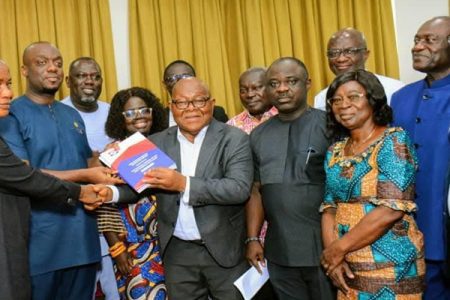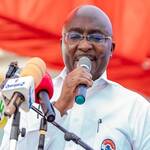The Oquaye Report has provided a frank, detailed assessment of the factors that led to the New Patriotic Party’s (NPP) crushing defeat in the 2024 general elections.
In a wide-ranging reflection, the report identified several internal and external pressures that led to voter discontent and anger, culminating in the party’s defeat.
The economic challenges, controversial policies, and internal divisions are now seen as significant missteps that left many voters frustrated and dissatisfied with the ruling government.
Key leaders of the NPP led by the General Secretary Justin Kodua Frempong have been dropping some of the details.
Crushing economic hardship
One of the most critical factors that the pointed to was the ongoing economic pressure faced by Ghanaians.
High inflation rates, skyrocketing fuel prices, and an overall rising cost of living weighed heavily on the electorate.
Despite the government’s efforts to stabilize the economy, the prices of essential goods and services continued to soar, leaving many Ghanaians struggling to make ends meet.
Salaries failed to keep pace with inflation, and widespread financial distress particularly affected young people, small business owners, and public sector workers.
Discontent among these key demographics turned into anger at the ballot box, where many chose to punish the ruling party for what they saw as neglect and mismanagement of the economy.
E-Levy
The policies introduced by the NPP government were also a major source of anger among voters.
The report mentioned that the controversial E-Levy, which was introduced to help raise revenue for the government, was one of the key points of contention.
The policy, which had faced intense opposition from the public, was considered by many as an unfair burden on ordinary citizens who were already struggling with economic difficulties.
The report identified government’s refusal to listen to its own party members and the public on these issues created a sense of arrogance in power, further alienating key voter groups.
Unpaid workers
Adding to the electorate’s fury was the government’s failure to pay workers under key social intervention programs.
Beneficiaries of the Nation Builders Corps (NABCO), youth in afforestation workers, and caterers under the School Feeding Programme went months without salaries.
The lack of payment to these groups not only hurt thousands of households but symbolized for many voters the broader financial mismanagement of the government.
Workers who had once been staunch supporters of the NPP, grateful for employment opportunities, felt abandoned and betrayed — fueling a wave of anger that translated into lost votes.
Timing of the fuel price hike
The report also pointed to a highly unpopular fuel price hike just days before the election as one of the final nails in the coffin for the NPP’s campaign.
With the country already reeling from economic difficulties, the timing of the fuel price increase just three days before Election Day was a critical misstep.
“When I heard that the price of fuel was going up right before the election, I thought it was a joke,” Dr. Bawumia confessed.
The decision to increase fuel prices at such a sensitive moment angered many voters, particularly those in the transport sector.
The price hike, seen as an insult to an already suffering population, was the final straw for many undecided or wavering voters.
Drivers and everyday citizens expressed their outrage, which contributed to an increasingly negative perception of the government and its inability to address the everyday struggles of the Ghanaian people.
Consequences of ignored warnings
Each ignored warning deepened resentment among voters who felt sidelined and disrespected by their own government.
Instead of seeing policies tailored to ease their burdens, they saw policies that worsened their plight — a decision many voters decided to punish on election day.
Internal disunity and public infighting
Perhaps one of the most damaging factors was the internal disunity that tore through the NPP’s ranks.
Internal bickering and explosive public comments from prominent NPP figures deeply hurt the party’s image.
This internal warfare painted a picture of a party at war with itself, giving the opposition the perfect opportunity to portray the NPP as divided, chaotic, and unfit to govern.
Even voters who might have remained loyal to the party became disillusioned by the spectacle of NPP members turning on each other.
Neglect of grassroots members
The disunity in the NPP was further compounded by the failure to address party grievances and suggestions from grassroots members.
Party members had repeatedly called for a reshuffle to address perceived stagnation in government, but their voices went unheard.
The refusal to address these concerns created a sense of alienation and frustration among the party’s supporters, who felt their input was being disregarded by those in power.
Unsatisfactory anti-galamsey fight
The report also cited public dissatisfaction with the government’s fight against galamsey as a key factor in the defeat.
In the final three months leading up to the December 7 elections, there was mounting pressure on the government to declare a state of emergency on illegal mining.
Several groups, including the Catholic Church, organized protest walks demanding decisive action against galamsey
National Cathedral
One symbolic issue that seriously damaged the NPP’s reputation was the controversial National Cathedral project which had consumed state funds without any clear completion date, became a rallying cry for angry voters.
Religion and ethnicity didn’t cause defeat
Nothing in the report suggests that religion and ethnicity caused NPP’s loss, pointing instead to a toxic mix of economic hardship, policy blunders, internal disunity, and arrogance of power that angered voters across the country.
Instead, deep voter frustration over economic pressures, controversial government policies, and a glaring failure to listen to party members and the public led to the NPP’s downfall.
Moving forward with lessons learned
The 2024 flagbearer Dr. Dr Mahamudu Bawumia praised the Oquaye Committee for producing what he described as a “comprehensive and insightful” report on the party’s defeat and the path forward.
The committee’s work debunked misinformation and scapegoating that sought to blame individuals or factions within the party.
Instead, Dr Bawumia, said the report provided a sober analysis of real issues — governance mistakes, internal disunity, poor communication, and arrogance of leadership.
He emphasized that the report must be used as a blueprint for rebuilding the party, stressing the need for greater inclusiveness, regular reshuffles to avoid stagnation, stronger grassroots engagement, and better communication structures.
Renewed focus on grassroots strength
Expressing deep gratitude to the party’s polling station executives and grassroots supporters, Dr. Bawumia noted that these individuals were the backbone of the NPP’s historic successes.
He vowed that future reforms would prioritize their needs and voices
Without the support of the grassroots, he warned, no political party could hope to achieve national victory.
Engaging directly with members, respecting their feedback, and addressing their concerns would be critical if the NPP hoped to regain the trust of the Ghanaian people.
A party at the crossroads
The 2024 defeat was a painful but necessary wake-up call for the New Patriotic Party.
Regaining the confidence of the electorate will require humility, hard work, unity, and a renewed focus on serving the people — not ruling over them.
‘Thank You Tour’
As the NPP embarks on ‘Thank You Tour’ and plots a path toward renewal, the lessons of 2024 will remain a powerful reminder: no party is invincible, and the will of the people must never be taken for granted.
The tour, themed “In All Things, Give Thanks to God” (1 Thessalonians 5:18), underscores the Party’s enduring commitment to acknowledging divine providence throughout its political journey.
Beyond expressing gratitude, the initiative will offer the 2024 Presidential Candidate and the Party’s Campaign Team a valuable opportunity to reconnect with grassroots supporters and reaffirm their deep appreciation for the collective efforts that fueled the electoral campaign.
The nationwide exercise will culminate in interfaith national thanksgiving services, uniting Christian and Islamic communities in a shared celebration of faith, resilience, and national unity.
The tour commenced in the Western Region on April 26, 2025, before progressing through all sixteen regions of Ghana.
Key strongholds, including the Ashanti Region (scheduled for April 29 to May 1) and the Greater Accra Region (from 10 to 12 May), will feature prominently in the itinerary.
The Central Region will host the final events of the tour on Wednesday, June 4, 2025.
Each regional engagement will include constituency-level gatherings, fostering direct interactions between Party leadership and the rank-and-file.
These meetings aim to strengthen Party unity, uplift morale, and energize supporters for future political activities.
The NPP has encouraged all faithful to actively participate in this national expression of gratitude by attending the events organised within their respective regions and constituencies. Regional and constituency gatherings will serve as vibrant platforms for celebrating the Party’s shared victories and renewing its commitment to the future.
Party leaders believe that this initiative will not only deepen the NPP’s bond with its supporters but also promote a stronger culture of appreciation, unity, and democratic engagement within the Party and the broader Ghanaian society.
The tour will conclude with solemn interfaith thanksgiving services, affirming the Party’s belief in the power of national cohesion and spiritual reflection as foundations for enduring political success.
By ELVIS DARKO, Accra
- Monday, April 28, 2025 Newspaper Headlines - 28 April 2025
- Oquaye report findings revealed - 28 April 2025
- GFA President Kurt Okraku appointed CAF’s second Veep - 28 April 2025

